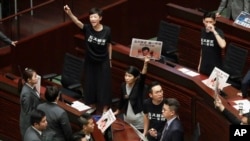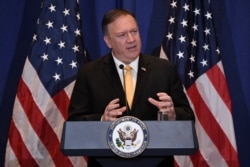U.S. officials are renewing their call for a "humane" solution to the situation in Hong Kong, where ongoing protests show no immediate sign of ending.
"In Hong Kong, we believe that the freedoms of expression and peaceful assembly — core values that we share with the people of Hong Kong — must be vigorously protected," said David Stilwell, assistant secretary of state for East Asian and Pacific affairs, during a Senate Foreign Relations Subcommittee hearing on Wednesday.
Stilwell said the U.S. continues to urge Beijing to uphold its commitments to respect Hong Kong's high degree of autonomy.
Earlier in an interview with Fox Business Network on Wednesday, Secretary of State Mike Pompeo said protesters in Hong Kong are asking the Chinese government to honor its promises under the 1984 Sino-British Joint Declaration, as well as the so-called "One Country, Two Systems," framework after China resumed control of Hong Kong from British colonial rule on July 1, 1997.
"They are asking the Chinese leadership to respect that commitment that they made. They made it to the British in the agreement that was submitted to the U.N. That has been U.S. policy," said Pompeo.
"The president has also said that he wants to make sure that China treats the individuals there humanely," added Pompeo. "Those are the things that are at the center of American policy with respect to Hong Kong."
The top U.S. diplomat's remarks come a day after the U.S. House of Representatives unanimously passed the "Hong Kong Human Rights and Democracy Act," under which the secretary of state is required to certify each year that Hong Kong retains its autonomy in order to receive special treatment as a major financial center.
While the legislation also needs to pass the U.S. Senate and be signed into law by President Donald Trump, it already has strong bipartisan support among senators.
Sen. Jim Risch, the Republican chairman of the U.S. Senate Foreign Relations Committee, said Wednesday he hoped the full Senate would vote soon on the legislation.
Wednesday, China's Foreign Ministry said Beijing resolutely opposes the legislation, with officials threatening to take steps to counter any such action.
"We will take effective countermeasures against the wrong decision made by the U.S., and the wrong behavior of the U.S. that harms China's interests," said Chinese Foreign Ministry spokesperson Geng Shuang. "We will resolutely safeguard our sovereignty and developmental interests."
The spokesperson did not elaborate on what such countermeasures would be.
What began in June as protests against a proposed bill that would have allowed criminal suspects to be extradited to mainland China has evolved into demands for full democracy for Hong Kong. Demonstrators there are also calling for an independent inquiry into possible use of excessive force by police, complete amnesty for all activists arrested and Hong Kong Chief Executive Carrie Lam's resignation.
Since June, more than 2,000 protesters have been arrested in Hong Kong. One-third of those facing prison time are 18 years old or younger.
While the vast majority of protests have been peaceful, there have been increasing incidents of violence during which masked activists have vandalized businesses and the city subway system, and attacked police with bricks and homemade gasoline bombs.









